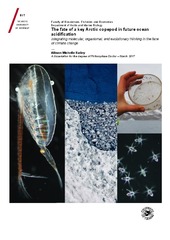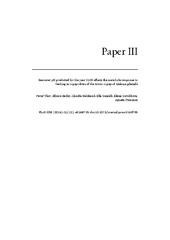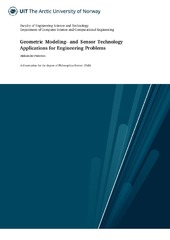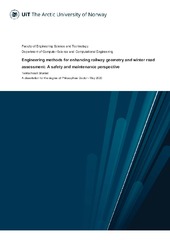| dc.contributor.advisor | Svensen, Camilla | |
| dc.contributor.author | Bailey, Allison Michelle | |
| dc.date.accessioned | 2017-04-27T10:17:31Z | |
| dc.date.available | 2017-04-27T10:17:31Z | |
| dc.date.issued | 2017-05-05 | |
| dc.description.abstract | Uptake of anthropogenic carbon dioxide (CO2) into the world’s oceans is increasing seawater acidity in a process termed ocean acidification. This is predicted to have harmful effects on a variety of marine organisms. With the greatest and fastest changes in pH expected to occur the Arctic seas over the next 100 years, the need for understanding the effects of low pH on Arctic marine organisms is pressing. This thesis examines the effects of projected levels of ocean acidification on the physiology of a key component of the Arctic marine ecosystem, the copepod Calanus glacialis, using molecular, organismal, and evolutionary methodologies to investigate the effects of low pH throughout its lifespan, in combination with other stressors (food availability) and across geographically distant sub-populations (to predict their capacity for adaptation or acclimation in the future). Young stages of the copepod, potentially the most sensitive, were tolerant to realistic pH levels for future ocean acidification: the nauplii developed successfully from egg to naupliar stage N6 at all four pH treatments investigated (pH 7.5, 7,7, 7.9 and 8.05). Gene expression N6 nauplii supported the organismal-level tolerance observed, indicating only mild gene expression and no stress response to low pH. Detrimental effects were found, however, in the young copepodite stages (C2-C4), which indicated an energetic cost at low pH. However, differences in this response between geographically distant, and potentially genetically isolated sub-populations showed that those that lived in a low pH environment tolerated it better, indicating that C. glacialis may be able to alleviate these detrimental effects over time. C. glacialis populations face a myriad of environmental changes driven by global warming and ocean acidification in the Arctic, and while they may experience declines due to the interactions of these multiple stressors, they likely will not experience declines primarily due to ocean acidification. | en_US |
| dc.description.doctoraltype | ph.d. | en_US |
| dc.description.popularabstract | Uptake of anthropogenic carbon dioxide into the world’s oceans is increasing seawater acidity in a process termed ocean acidification. This is predicted to have harmful effects on a variety of marine organisms. With the greatest and fastest changes in pH expected to occur the Arctic seas over the next 100 years, the need for understanding the effects of low pH on Arctic marine organisms is pressing. This thesis examined the effects of projected levels of ocean acidification on the physiology of a key component of the Arctic marine ecosystem, the copepod Calanus glacialis, using molecular, organismal, and evolutionary methodologies. While the youngest and oldest stages appear to be quite tolerant, we found detrimental effects of low pH in the previously unstudied middle stages. However, we also found indications that the species may be able to adapt or acclimatize to gain tolerance to low pH, indicating that C. glacialis populations may be able to survive future ocean acidification. | en_US |
| dc.description.sponsorship | Research Council of Norway (HAVKYST Project #225279)
Fram Centre (FRAM - High North Research Centre for Climate and the Environment)
Norwegian Polar Institute | en_US |
| dc.description | The papers I, II and III of this thesis are not available in Munin. <br>
Paper I: Bailey, A., Thor, P., Browman, H. I., Fields, D. M., Runge, J.,
Vermont, A., Bjelland, R., Thompson, C., Shema, S., Durif, C. M. F., Hop, H.: “Early life stages of the Arctic copepod Calanus glacialis are unaffected by increased seawater pCO2”. Available in <a href=http://dx.doi.org/10.1093/icesjms/fsw066> ICES Journal of
Marine Science 2016. </a>
<br>
Paper II: Bailey, A., De Wit, P., Thor, P., Browman, H. I., Bjelland, R., Shema, S., Fields, D. M., Runge, J. A., Thompson, C., Hop, H.: “Regulation of gene expression underlies tolerance of the Arctic copepod Calanus glacialis to CO2-acidified seawater”. (Manuscript).
<br>
Paper IV: Thor, P., Bailey, A., Dupont, S., Calosi, P., Søreide, J., De Wit, P., Guscelli, E., Loubet-Sartrou, L., Deichmann, I., Candee, M., Svensen, C., King, A. L., Bellerby, R. G.J.: “Potential for rescue from future ocean acidification by extant physiological differences among distinct Arctic copepod populations”. (Manuscript). | en_US |
| dc.identifier.isbn | 978-82-8266-138-6 | |
| dc.identifier.uri | https://hdl.handle.net/10037/10963 | |
| dc.language.iso | eng | en_US |
| dc.publisher | UiT The Arctic University of Norway | en_US |
| dc.publisher | UiT Norges arktiske universitet | en_US |
| dc.rights.accessRights | openAccess | en_US |
| dc.rights.holder | Copyright 2017 The Author(s) | |
| dc.rights.uri | https://creativecommons.org/licenses/by-nc-sa/3.0 | en_US |
| dc.rights | Attribution-NonCommercial-ShareAlike 3.0 Unported (CC BY-NC-SA 3.0) | en_US |
| dc.subject | VDP::Matematikk og Naturvitenskap: 400::Zoologiske og botaniske fag: 480::Økotoksikologi: 489 | en_US |
| dc.subject | VDP::Mathematics and natural science: 400::Zoology and botany: 480::Ecotoxicology: 489 | en_US |
| dc.subject | VDP::Matematikk og Naturvitenskap: 400::Zoologiske og botaniske fag: 480::Marinbiologi: 497 | en_US |
| dc.subject | VDP::Mathematics and natural science: 400::Zoology and botany: 480::Marine biology: 497 | en_US |
| dc.subject | VDP::Matematikk og Naturvitenskap: 400::Zoologiske og botaniske fag: 480::Økologi: 488 | en_US |
| dc.subject | VDP::Mathematics and natural science: 400::Zoology and botany: 480::Ecology: 488 | en_US |
| dc.subject | VDP::Matematikk og Naturvitenskap: 400::Basale biofag: 470::Bioinformatikk: 475 | en_US |
| dc.subject | VDP::Mathematics and natural science: 400::Basic biosciences: 470::Bioinformatics: 475 | en_US |
| dc.subject | VDP::Matematikk og Naturvitenskap: 400::Basale biofag: 470::Genetikk og genomikk: 474 | en_US |
| dc.subject | VDP::Mathematics and natural science: 400::Basic biosciences: 470::Genetics and genomics: 474 | en_US |
| dc.title | The fate of a key Arctic copepod in future ocean acidification: Integrating molecular, organismal, and evolutionary thinking in the face of climate change | en_US |
| dc.type | Doctoral thesis | en_US |
| dc.type | Doktorgradsavhandling | en_US |


 English
English norsk
norsk




